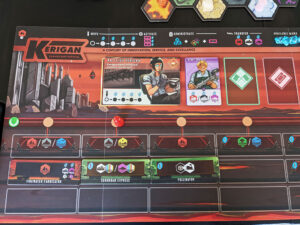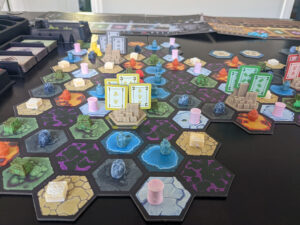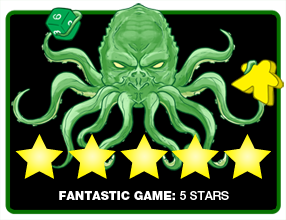 How do you make a train game exciting? Auctions? A tight, unforgiving economy? Theme it around everyone’s favorite year in the 19th century? Nope. Magic. It takes magic to make a train game exciting. That’s what Empyreal Spells and Steam attempts here.
How do you make a train game exciting? Auctions? A tight, unforgiving economy? Theme it around everyone’s favorite year in the 19th century? Nope. Magic. It takes magic to make a train game exciting. That’s what Empyreal Spells and Steam attempts here.
In Empyreal Spells and Steam (Empyreal), players will use their magical train companies’ unique powers to build routes and deliver goods via fast-paced engine building and special powers. Empyreal plays 2 to 6 players and takes about 20 minutes per player.
Gameplay Overview:
In Empyreal Spells and Steam, the goal is to amass the most points. There is a map with hexes and goods laid out on each hex at the start of the game. Each good has a static hub city in which it can be delivered to. In order to make a delivery, a player’s trains must occupy the spaces with the goods they are trying to deliver and you must be connected to the appropriate city. Then, they must reach the end of their player board and make a delivery. Players will receive points for each good delivered as well as receiving points for completing demand tiles (first to deliver 2, 3, or 4 of the same good). Additionally, the awards variant provides end-game scoring bonuses.

On a turn, a player can activate any of their available specialists, including their captain for special abilities. Then, the players can either administrate (reclaim mana, refresh captain, and engineer, and gain a spellcar) or move and activate. Move and activate is the main way in which trains are placed out on the board (building track). Players will move their conductor across their board, taking actions along the way by activating spellcars.
Most spellcars allow a player to build a track on a specific hex type that is in-network (usually adjacent to a current track). Some will place more goods on the board, gain or refresh mana, place wasteland, gain a new specialist, and more. Once a player moves their captain to the end of their board, they make a delivery and upgrade their company. Upgrading options include gaining, and refreshing mana, gaining and refreshing specialists, or gaining two new spellcars.
Throughout the game, players will be managing mana, the game’s main form of currency. Mana is spent to activate extra spellcars, move to the end of the board faster, and break adjacency rules for building track by paying for transfers.
The game ends when a player has collected the required amount of demand tiles or a player runs out of train cars to place. One more delivery is made by each player, then points are tallied.

Game Experience:
This was a must play for me based on the strength of Trey Chambers’ previous work, especially Argent the Consortium (Chambers, 2015). Argent brought a level of direct player interaction to worker placement games that we hadn’t really seen before. I really wanted to see what he could do to spice up another genre that usually didn’t blow me away: trains. I can say without hesitation, that he blew my expectations out of the water.

The first thing that stands out is the rules overhead and play time compared to the quality of decision making and depth of strategy. This game is a breeze to learn and teach. While set up can take 10-15 minutes, there’s nothing else standing in the way of getting a new group going on this. And because turns are quick, there’s very little downtime, and it can handle a large group in just a couple of hours. Now, it’s not 18xx heavy strategy. More like if you amplify Ticket to Ride strategy a few fold and added a great engine builder on top. All that without much additional rules overhead or play time.
The strategy beyond just track building in the right place and board position really comes from the engine building. First, you will be acquiring new spellcars that determine where you can place track and when. You’ll also be adding up to three unique specialists to your company board. These range from a small, ongoing effect to a strong ability that must be refreshed after each use to a once-per-game ability that will send shockwaves through the table and leave opponents asking, “Wait. You can do WHAT?”

Your engine must also be efficient. You will need to manage your mana, so you have enough to pull off big turns, and you’ll also need to be able to move down your board quickly to deliver goods before others do. Yes, the board gets crowded fast. Players will overlap and steal goods out from under one another regularly. You cannot ignore the other players, and I love that aspect of the game.
The strategy and interaction add a palpable tension to every play. Each turn can be agonizing as you choose your new spellcar or what upgrade you’ll take at the end of the line. Waiting for your turn can also be agonizing (in a good way). Cue internal dialogue: Please don’t build there, please don’t deliver those goods, please don’t take that spellcar I need. This game can be brutal and in your face. I am often looking for that kind of experience. Empyreal provides a tight competition for goods and upgrades.
Replay value is another huge plus for me. There are 8 captains to choose from for 6 different factions. There are also 67 spellcars and 51 specialists, and only a small fraction appear in each game. Not only will your board look and work completely different from your opponents’ boards, but also your board from game to game will be drastically different. All aboard for interesting and new combos.

The last thing I’ll talk about is the production. Level99 went above and beyond. What you see here are the deluxe components, but really the only difference is the plastic goods vs. cardboard chits. All the other stuff comes standard, and it’s glorious. Every company has unique train cars. Furthermore, while the box size is a bit egregious, they’ve created a wonderful and practical storage solution (think similar to Game Trayz). You’ll notice I didn’t talk about the theme of the game here. Besides the magic and wild abilities that can only take place in a world like Indines, the theme here does nothing for me positive or negative. I do like the colorful art, though.
Final Thoughts
If you couldn’t tell from my gushing, Empyreal Spells and Steam is one of my favorite games of all time. It works well at a wide range of player counts, provides deep decision making, endless replay value and variety, and a ton of tense interaction. I still pull this one out regularly, and it’s always a treat.
If you like the sound of a tight race to deliver goods with a magical twist, check this one out. This is Trey Chambers magnum opus until he outdoes himself again.
Final Score: 5 Stars – A wild and magical route and engine building game with seemingly endless variety and interactive tension throughout.
 Hits:
Hits:
• Fast to learn and play while maintaining a lot of strategy
• Tons of variability from play to play.
• Creates a lot of interaction and tension.
• Production is great.
• Handles high player counts well.
Misses:
• None























Sitting on the shelf un-played. Think it just moved up the list. Thanks!